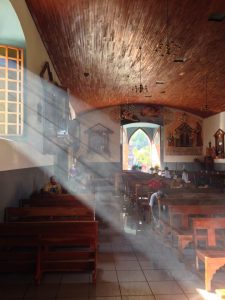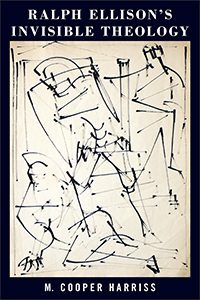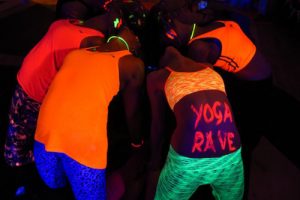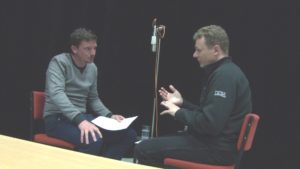Jesuits, Mormons, and American Religion in the World
Dr. Laurie F. Maffly-Kipp has written extensively on the importance of space and geography in studying American religions. I interviewed her at the University of Notre Dame, Cushwa Center's Seminar in American Religion. This session dealt with Dr. John McGreevy (History, Notre Dame)'s new book, "American Jesuits and the World." Maffly-Kipp and Thomas Bender (History, NYU) gave remarks about the book; McGreevy responded; and two hours of Q&A with scholars and graduate students followed.
My conversation with Maffly-Kipp begins with McGreevy's book, expands to include her work on Mormonism in contrast to Catholicism, and ends with a discussion of evangelical historian Mark Noll, in whose honor Notre Dame was originally going to host a conference, but was cancelled at the last minute. This free-ranging conversation nonetheless centers on Jesuits, Mormons, and transnational religious history.
Angel Spirituality
In Northern Europe today, many people are engaging with angels, and Tehri Utriainen has been researching them. What is angel spirituality, and who does it appeal to (hint: women)? As with many vernacular systems, it is both ad hoc and highly practical, with a strong focus on healing. She tells us how these practices challenge preconceptions about the relationship between new spiritualities and Christianity, and raise interesting questions about gender, and vernacular religion in supposedly post-Christian Europe.
Ralph Ellison’s Invisible Theology
In this interview, M. Cooper Harriss, author the book Ralph Ellison’s Invisible Theology, discusses his thoughts on the unseen theological dimensions of Ralph Ellison’s writings. Harriss begins with the figure of Ellison, whose novel, Invisible Man, offers a now-classic metaphor (“invisibility”) depicting the socio-cultural and political issues and obstacles that African Americans experienced in the mid-twentieth century. By claiming the invisible not simply as a materialist term but a metaphysical one as well, Harriss contends that despite—or even because of—his status as a thoroughly “ secular” novelist and critic, Ellison’s writing reflects important theological trends and issues that mark his age and the cultural inheritances of his literary production. Harriss also identifies the scholars and thinkers who inform the methodological moves that he makes in the book, and he reflects on the abiding relevance of Ellison’s life and insights. Ralph Ellison’s Invisible Theology troubles regnant assumptions surrounding the religious and theological dimensions of racial identity and, indeed, the very fraught relationships between the terms “religion” and “theology” in contemporary academic discourse.
Evangelical Yoga: Cultural Appropriation and Translation in American Religions
Dr. Brown began her career as a historian of evangelicalism, and soon branched out into the study of religious healing and "new religions" in the U.S. In this interview, we discuss her interest in yoga as a new American phenomenon and the way that some evangelical Christians practice it. Brown provides a historic overview of bodily–religious practices in America, starting with mesmerism, occultism, osteopathy, and chiropractic in the nineteenth century. These practices challenged the standard "heroic" model of medicine: Instead of the patient experiencing torturous medical treatments, a practitioner simply realigns the patient's body or does a quick procedure. Such bodily practices blurred, in some cases, with Pentecostal and Holiness Christians' use of prayer as a medical treatment. (Today, many chiropractors retain an interest in bodily energy and proper alignment, though they may not articulate this view to their patients.)
As the nineteenth century progressed, many Americans consumed translations of Hindu and Buddhist literature. Asian concepts of bodily practice and energy fields (qi, meridians, chakras) entered the lexicon of new American religions. Theosophy, in particular, borrowed from Hindu and Buddhist concepts. The introduction of Eastern metaphysics to America created a small market for the introduction of yoga. This market grew in the 20th century as Vivekananda and Yogananda brought forms of yoga (and, in Yogananda's case, a hybrid of Hinduism & Christianity) to the U.S. Today, evangelical Christians are adopting yoga, finding parallels between chakras and the Holy Spirit, or — in an act of cultural appropriation — creating a new kind of yoga shorn of Hindu references. The American Hindu community has criticized such cultural appropriation. Some Hindus have also suggested that a Christian doing yoga poses, or asana, may slowly convert to Hinduism, making evangelical yoga a stealth victory for Vedic culture.
The interview concludes with a discussion of Dr. Brown's field research methods, along with her and Mr. Gorman's thoughts about secularization in America and the inadequacies of secularism as a research concept.
Editor's Note: On 29 June 2017 we published a response to this interview, written by Philip Deslippe, which provides an important and well-argued counter-narrative to this interview. As with every podcast we publish, we encourage listeners/readers to digest the podcast in tandem with the response(s) , to explore further if interested, and to get in touch in the comments, via email, or on social media to continue the discussion.
Black Religious Movements and Religio-Racial Identities during the Great Migration
In this podcast, Judith Weisenfeld talks to Brad Stoddard about her new book, New World A-Coming: Black Religion and Racial Identity during the Great Depression. In this book, Weisenfeld explores several social groups in the early 1900s who combined religious and racial rhetoric to fashion new identities. These groups include the Nation of Islam, the Moorish Science Temple, and Father Divine’s Peace Mission Movement, and various Ethiopian Hebrews. These groups are not new to scholars of American religious history; however, Weisenfeld’s original analysis combined with her use of previously overlooked sources combine to tell a new and compelling story about these familiar groups.
Islamic Millennialism
We may tend to think of millennialism as something typical of New Religious Movements and christian fundamentalism, but it has a long and interesting history in the Islamic world too. Rob Gleave, Professor of Arabic Studies at Exeter, takes us through the history of Islamic millennialism, and explains how it has been tied up with political events in the past, as well as the present. He raises interesting points about how the unusual form of Twelver Shi'ite millennialism developed from Islamic theological discourse.
This podcast was generously supported by cenSAMM, the centre for the study of Apocalyptic and Millennial Movements. This podcast is also sponsored by the postgraduate taught programmes in Religious Studies at the University of Edinburgh, Scotland. Many of the RSP team have been through the Edinburgh RS programme, which comes highly recommended. Find out more here.
Hindu Traditions in Contemporary British Communities
The spread of religion and practice from origin points to global phenomena is a prevalent topic within religious studies. Stephen Jacobs, a senior lecturer at Wolverhampton University, and Theodora Wildcroft, a PhD researcher at Open University UK, are both interested in the common presence of yoga and bhakti tradition in the contemporary British rave and festival communities. This podcast explores how Hindu belief and traditions have been incorporated into modern western practices. An overview of the British kirtan community and the Art of Living movement is followed by a discussion of authenticity, reconciliation of tradition and modernity, and the influence of popular culture. As appropriation of culture and questions of authenticity pervade conversations across fields, the study of contemporary British Hindu movements is important in understanding how millennia old religious traditions are being used in new, modern contexts.
This podcast is sponsored by the postgraduate taught programmes (Masters and PhD) in Religious Studies at the University of Edinburgh, Scotland. Many of the RSP team have been through the Edinburgh RS programme, which comes highly recommended. Find out more here.
What do we mean by Indigenous Religion(s)?
We talk a lot about the World Relgions Paradigm at the Religious Studies Project, and this discussion looks more closely at one of the ancillary categories, Indigenous Religion. What exactly does this term refer to? Does it refer to specific religions (plural) or a kind of religion (singular)? What makes some religions indigenous and not others? What are the political implications? Bjorn Ola Tafjord & Arkotong Longkumer outline some of the language games that involve Indigenous Religion.
This podcast is sponsored by the postgraduate taught programmes (Masters and PhD) in Religious Studies at the University of Edinburgh, Scotland. Many of the RSP team have been through the Edinburgh RS programme, which comes highly recommended. Find out more here.
‘Modelling Religion’ and the Integration of the Sciences and the Humanities in the Bio-cultural Study of Religion
Following his Albert Moore Memorial Lecture at Otago University, celebrating 50 years of Religious Studies at Otago, Professor Wesley Wildman talks to Thomas White regarding the integration of the sciences and the humanities in his bio-cultural approach to the study of religion.
Wildman argues that the methods and knowledge of the empirical sciences, from evolutionary biology to neuroscience, are increasingly gaining authority in the study of religion. This is to be welcomed. Yet when scientists pursue the study of religion unassisted, they can often slip into simple category errors, or fail to recognise important contextual nuance. The expert collaboration of humanities scholars is essential for ensuring this new and growing area of scholarship remains conceptually rigorous and culturally informed. The two fields of academia must work together, but sometimes, institutional and ideological barriers can prevent such cooperation, not least regarding the use of ‘religion’ as a general category.
Wildman’s current project ‘Modelling Religion’ (which uses computer simulations to explore religious behaviour), offers a compelling case for Wildman’s mixed methods approach. Whilst also admitting the project’s limitations, Wildman explains how computer simulations of social and psychological processes can provide fresh input on long-standing, previously irresolvable theoretical debates in the study of religion. The interview finishes with Wildman speaking on the practical aspects of working on such mixed-method projects, including how younger scholars should prepare themselves should they wish to participate in similar research endeavours in future.
This podcast is sponsored by the postgraduate taught programmes (Masters and PhD) in Religious Studies at the University of Edinburgh, Scotland. Many of the RSP team have been through the Edinburgh RS programme, which comes highly recommended. Find out more here.
Muslim NGOs and civil society in Indonesia
Religion and NGOs
Produced by R. Michael Feener
While the service provision activities of some religious NGOs complement and enhance systems of low state capacity, in others they compete with state services and in still others service delivery by religious NGOs is associated with political parties and forms part of their electoral strategies. Across diverse engagements, then, religious NGOs depend on their ability to elude, enrol, and subvert the state institutions – while states themselves adjust to the impact of these new actors in turn. In this interview with Robert Hefner about his research on Muslim NGOs in the Javanese city of Yogyakarta, and what his findings can show us about Islam and civil society in contemporary Southeast Asia.
Since the turn of the twenty-first century, there has been a remarkable surge of interest among both academics and policy makers in the effects that religion has on international aid and development. Within this broad field, the work of ‘religious NGOs’ or ‘Faith-Based Organisations’ (FBOs) has garnered considerable attention. This series of podcasts for The Religious Studies Project seeks to explore how the discourses, practices, and institutional forms of both religious actors and purportedly secular NGOs intersect, and how these engagements result in changes in our understanding of both ‘religion' and ‘development’. These interviews with leading scholars working on the topic across diverse contexts in Asia (and beyond) have been conducted by Dr. Catherine Scheer & Dr. Giuseppe Bolotta of the National University of Singapore’s Asia Research Institute. Our work on this has been generously supported by a grant from the Henry Luce Foundation.







